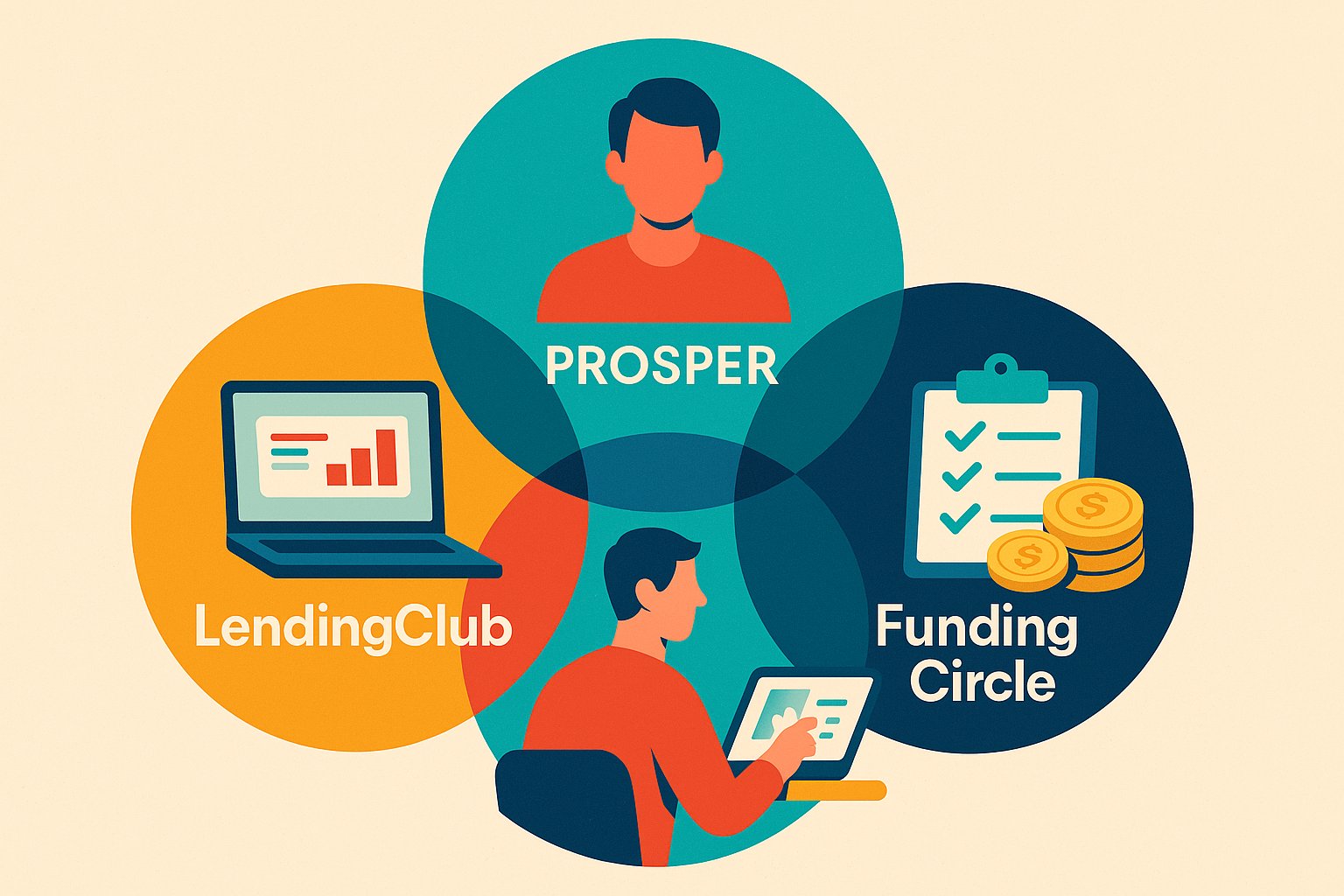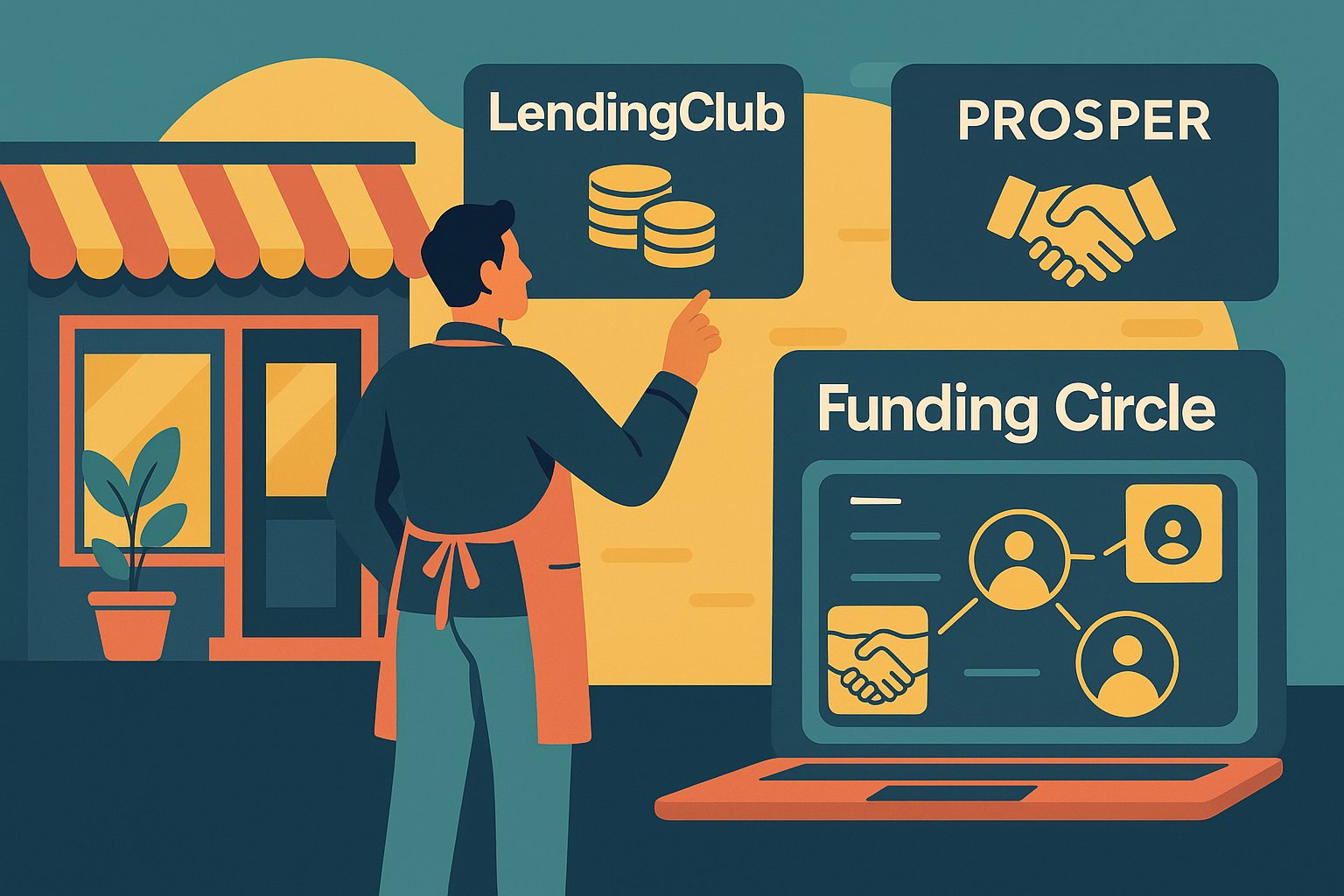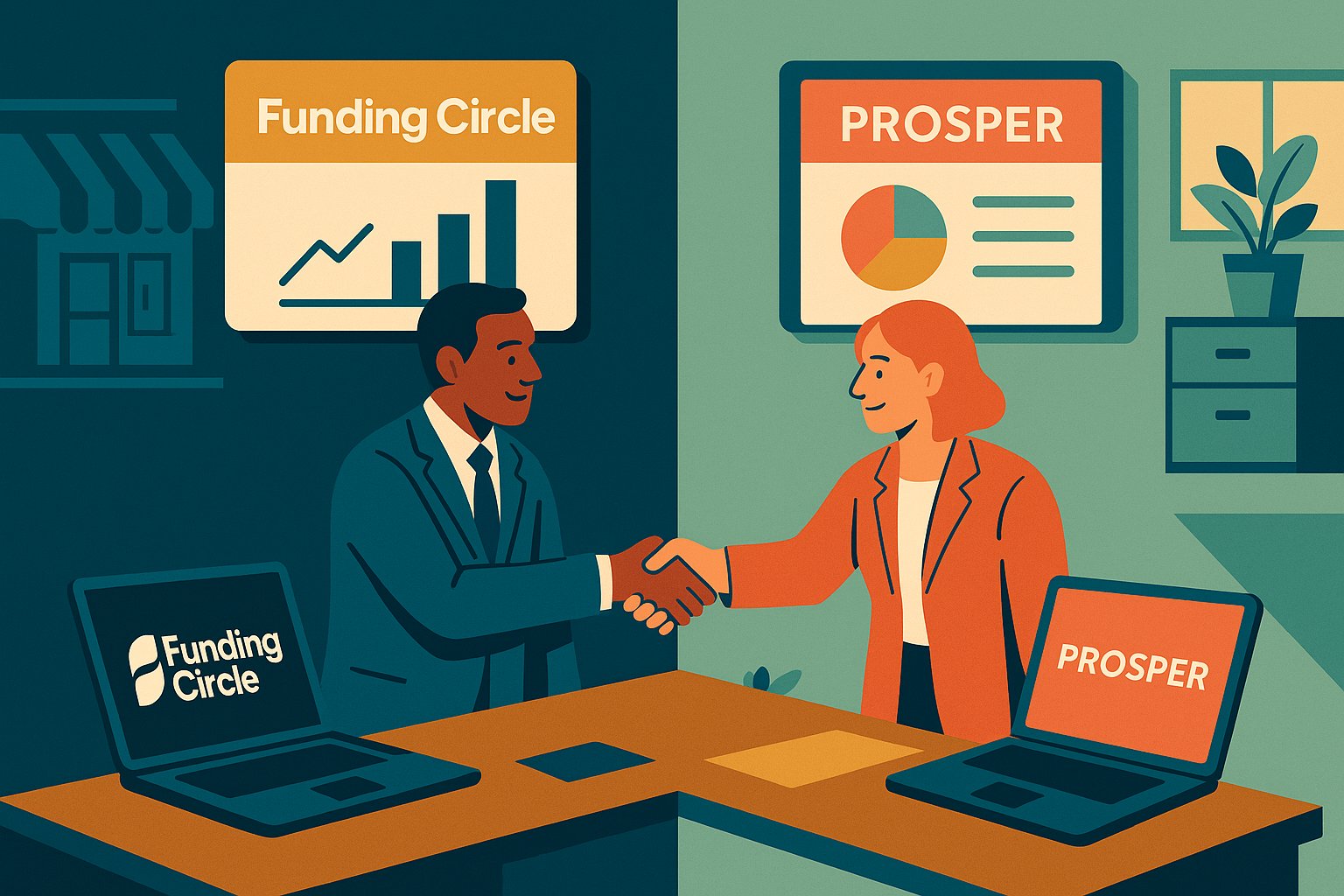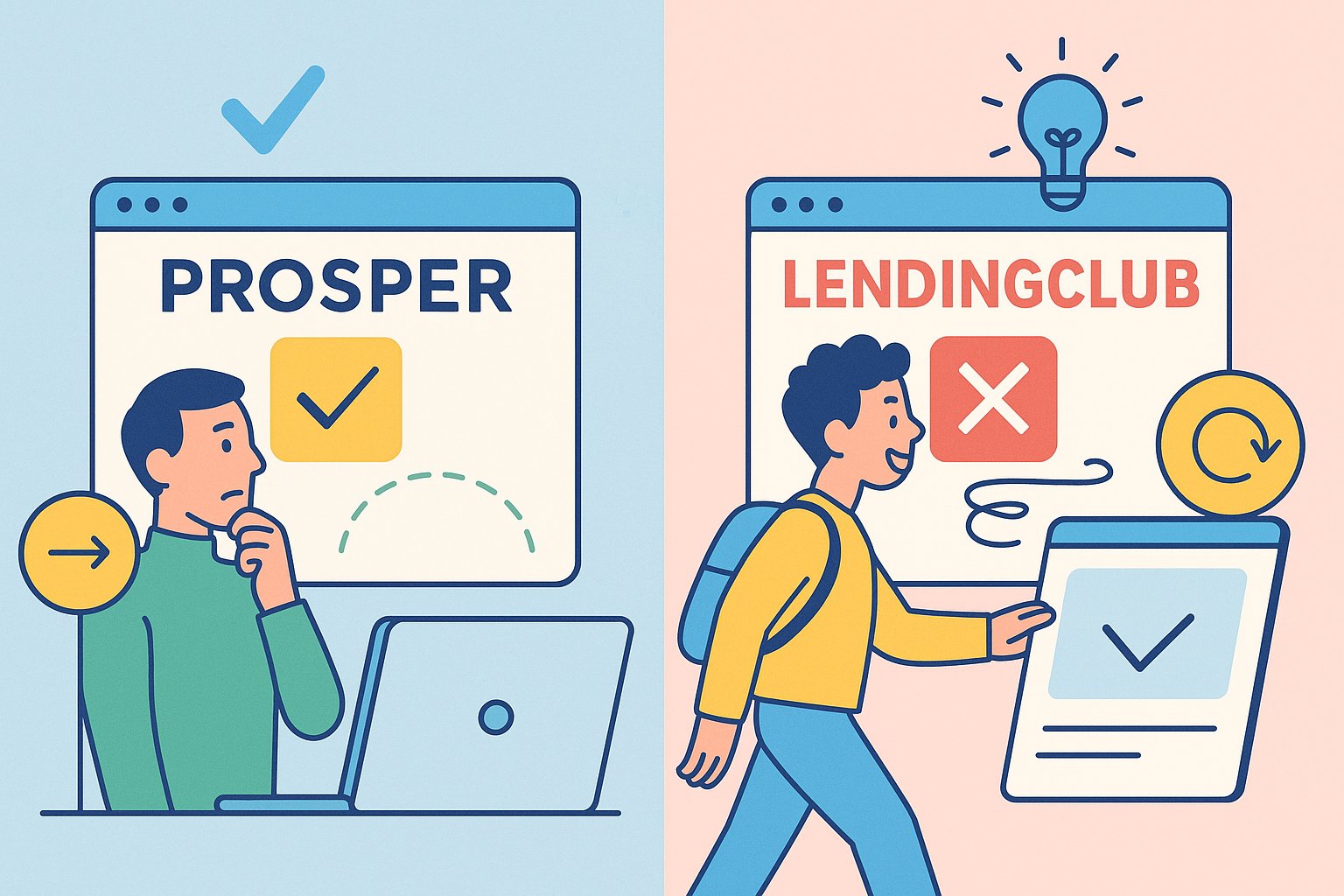The Digital Lending Revolution: A New Era of Borrowing
Gone are the days when securing a personal or business loan meant navigating a maze of bank branches, lengthy paperwork, and opaque criteria. Today’s online lending marketplaces—Prosper, LendingClub, and Funding Circle—have transformed how borrowers connect with capital. While each platform operates under the broader peer-to-peer or marketplace lending umbrella, their unique approaches, fee structures, and target audiences set them apart. In this comprehensive guide, we’ll dive into the nuances that make Prosper, LendingClub, and Funding Circle standout competitors in the fintech space, empowering you to decide which lender best aligns with your borrowing needs.
How Prosper Carved Out Its Consumer Lending Niche
Launched in 2006 as one of the first peer-to-peer lending pioneers, Prosper quickly distinguished itself by focusing primarily on unsecured personal loans. Borrowers seeking debt consolidation, home improvement funds, or credit card payoffs turned to Prosper’s intuitive online platform for a streamlined experience. The hallmark of Prosper’s model rests on a two-step credit check: a soft inquiry that reveals potential rates without hurting credit scores, followed by a hard inquiry upon loan acceptance. This approach gives first-time and repeat borrowers alike a transparent glimpse into their borrowing potential. Prosper’s APRs typically span from high single digits to the mid-teens for prime credit profiles, with origination fees ranging from 2.4% to 5%. By displaying the projected monthly payment, total interest paid, and net loan amount upfront, Prosper earns praise for its clear, no-surprises fee disclosure that resonates with borrowers wary of hidden costs.
Beyond transparent pricing, Prosper’s peer-to-peer architecture relies on individual and institutional investors to fund loans. While this can occasionally introduce slight interest rate variability—driven by investor demand—Prosper has refined its risk assessment models over the years, reducing the frequency of dramatic rate swings. For borrowers who prioritize fast, consumer-friendly loans up to $40,000 or $50,000, Prosper’s digital-first interface, combined with a well-developed knowledge base and customer support team, makes it a compelling choice for straightforward personal financing needs.
LendingClub’s Dual Focus: Bridging Consumer and Small Business Finance
Founded a year after Prosper in 2007, LendingClub emerged with a similar proposition: bring transparency and efficiency to lending by bypassing traditional banks. However, as LendingClub matured, it carved out a dual-product strategy—maintaining a strong presence in consumer personal loans while expanding into small business lending. Today, LendingClub Business complements its personal loan offerings, providing term loans ranging from $5,000 to $500,000 for companies with at least one year of operation and $75,000 in annual revenue. By integrating business loan operations into its established consumer platform, LendingClub offers a consolidated experience that attracts both individual borrowers and entrepreneurs.
In terms of consumer lending, LendingClub employs a clear conditional approval system: a soft credit check instantly reveals prequalification ranges—often $5,000, $10,000, or $20,000—alongside APR estimates. Borrowers then complete a brief application, link bank accounts for income verification, and receive final approval, typically within two days. LendingClub’s APRs span from around 7% to 24%, reflecting a blend of credit scores and debt-to-income ratios. Origination fees generally range from 3% to 6%, though periodic promotions may waive or reduce these costs for qualified applicants. LendingClub’s user experience stands out for its guided prompts, contextual hints on each application field, and an integrated dashboard that lets borrowers monitor payments and pending balances effortlessly.
For entrepreneurs, LendingClub Business further streamlines the borrowing journey by leveraging existing consumer underwriting technology. While the platform still considers personal credit history, it also evaluates business cash flow, financial statements, and debt service coverage. This hybrid approach allows small business owners to tap into both personal and business financing UIs under one roof. Borrowers looking for flexible loan amounts with swift funding—often within three to five business days—frequently cite LendingClub’s user-friendly interface and promotional fee offers as strong incentives to choose this marketplace.
Funding Circle’s Sharp Focus on Established Business Borrowers
Unlike Prosper and LendingClub, which blend consumer and small business loan options, Funding Circle zeroes in on business financing. Established in the United Kingdom in 2010 and launching in the U.S. in 2013, Funding Circle built its reputation as a dedicated small and medium-sized business (SMB) lender. By excluding consumer loans entirely, the platform channels its underwriting expertise exclusively toward businesses with proven track records. To qualify for a loan, applicants typically must have at least two years of operating history, $150,000 or more in annual revenue, and a minimum credit score in the mid-600s range. Loant amounts start at $25,000 and can climb to $500,000—or even higher—depending on institutional investor demand.
Funding Circle’s hallmark is its business-centric underwriting engine, which combines automated analysis with manual review by experienced credit analysts. Loans feature fixed APRs—often in the mid-single-digit range for strong borrowers—and terms span from six months to five years. A one-time origination fee, usually between 3% and 6%, is clearly disclosed during application. Borrowers appreciate that once they submit business tax returns, bank statements, and financial statements, they receive an approval decision within three to five business days and funding in as few as two days post-approval. Funding Circle’s streamlined dashboard keeps borrowers informed about document status, anticipated funding dates, and payment schedules, reducing guesswork and enhancing confidence.
For established businesses seeking reliable growth capital at competitive rates, Funding Circle’s singular focus on SMB lending delivers a level of specialization that consumer-first platforms can’t match. From manufacturing firms expanding production lines to service businesses investing in new hires, Funding Circle’s tailored solutions give entrepreneurs the clarity, flexibility, and support they need to scale operations efficiently.
Diving into Interest Rates and Fee Structures: A Side-by-Side Glance
When evaluating Prosper, LendingClub, and Funding Circle, understanding the total cost of capital is paramount. Prosper’s APRs generally range from the high single digits up to the mid-teens for strong credit profiles, with origination fees between 2.4% and 5%. Because Prosper pools individual and institutional investments, rates can fluctuate slightly as investor demand waxes and wanes—but the platform’s transparent fee breakdown helps borrowers anticipate the final disbursed amount accurately.
LendingClub’s APR spectrum extends from approximately 7% into the low twenties, reflecting a broader acceptance of borderline credit profiles. Origination fees typically fall between 3% and 6%, though limited-time promotions often waive or reduce these costs for qualified borrowers who spot them. For small business loans, LendingClub’s APRs can be as low as the high single digits for established companies—though they generally climb into mid-teens for borrowers with weaker business or personal credit. Borrowers praise LendingClub’s conditional approval tiers for showcasing multiple term-price scenarios simultaneously, enabling them to weigh three-year versus five-year terms side by side.
In contrast, Funding Circle’s business loans frequently yield single-digit APRs for companies meeting revenue and credit thresholds. Institutional capital backing ensures rate stability, insulating borrowers from investor-driven price swings. With origination fees between 3% and 6%—fully disclosed upfront—Funding Circle’s true transparency lies in offering one clear APR, one flat fee, and a precisely defined payment schedule. Mature businesses needing $100,000 or more often find Funding Circle’s cost of capital more attractive than consumer-focused platforms, especially when long-term planning is essential.
Application Journeys: Speed, Simplicity, and User Experience
A seamless application process can transform borrowing from a chore into a strategic advantage. Prosper kicks things off with a quick soft credit check that reveals potential loan amounts and APRs. After accepting an offer, applicants complete a detailed form requesting employment history, income verification, and personal financial data. Prosper’s requirement to upload pay stubs or bank statements can extend underwriting to 72 hours if documents must be manually reviewed. Despite this, the platform’s clear step-by-step prompts and thorough FAQs minimize confusion for first-time borrowers.
LendingClub speeds up underwriting by encouraging borrowers to link their bank accounts via a secure aggregation service. This automation verifies income and reduces manual document submission, often allowing final approval in 24 to 48 hours. LendingClub’s vibrant UI guides applicants through each stage, offering inline tips for questions about debt-to-income ratios, credit utilization, and employment history. The conditional approval system delivers immediate clarity on the range of loan amounts available, reducing the back-and-forth of multiple declined requests. For both personal and business loans, LendingClub—when documentation is complete—typically disburses funds within three business days post-approval.
By comparison, Funding Circle requires business tax returns, two years of financial data, and bank statements from an established business account. Although the documentation threshold is higher, Funding Circle’s specialized underwriting team streamlines the review process. Automated credit scoring combined with a manual sanity check yields approval decisions within three to five business days. Once cleared, borrowers receive funding in as few as two days, making the total timeframe competitive for larger business loans. Many businesses find that the upfront effort pays dividends, as Funding Circle’s clarity around required documents means fewer surprises mid-application.
Who Qualifies? Decoding Eligibility Criteria
Prosper welcomes borrowers with credit scores typically above 640, stable employment history, and manageable debt-to-income ratios. Annual income requirements usually hover around $35,000 or more, though Prosper examines each borrower holistically—factoring in housing costs and existing obligations. Because Prosper focuses on consumer loans up to $40,000 or $50,000, its criteria cater to individuals seeking moderate credit card debt consolidation, home improvement financing, or small personal expenses.
LendingClub sets its entry bar slightly higher for personal loans: borrowers often need a minimum credit score around 660, stable income, and a debt-to-income ratio under 40%. For small business loans, LendingClub requires at least one year of operation, $75,000 in annual revenue, and a personal credit score above 650. This hybrid model ensures that borrowers with modest credit can still access financing—albeit at higher APRs—while experienced entrepreneurs qualify for larger loan amounts with more competitive rates.
In contrast, Funding Circle focuses squarely on businesses that have been operational for at least two years, generate $150,000 or more in annual revenue, and hold credit scores above the mid-600s. Because Funding Circle’s underwriters assess company performance metrics—cash flow, profitability, industry trends—businesses with solid financial statements can secure loans up to $500,000 or more. Startups and early-stage companies or individuals without a business entity must seek consumer-focused marketplaces instead.
Repayment Flexibility and Borrower Support: Stress-Testing the Partnership
Securing funds is only half the battle; the real challenge often lies in repayment. Prosper allows borrowers to set up autopay, view an amortization schedule, and adjust payment dates via its clean dashboard. Late fees kick in immediately after a 15-day overdue threshold, which underscores the importance of disciplined budgeting. Prosper’s customer service team—accessible via phone and email—addresses borrower inquiries, but response times can sometimes stretch to 24 hours during peak seasons.
LendingClub elevates repayment flexibility with a forgiving grace period—typically five days past the due date before late fees apply—and a robust self-service portal. Borrowers can modify payment dates once per loan term, download detailed amortization tables, and sign up for autopay with a single toggle. The addition of live chat support, alongside phone and email options, empowers borrowers to ask real-time questions about due dates, autopay errors, or even requests for payment deferment in hardship cases. LendingClub’s interactive knowledge base further demystifies common repayment concerns, making the post-funding experience more reassuring.
As a business-focused lender, Funding Circle extends significant flexibility to SMB borrowers. Terms span from six months to five years, and companies can choose the repayment schedule that best aligns with their cash flow cycles. Crucially, Funding Circle imposes no prepayment penalties, allowing businesses to refinance or pay off loans early without incurring extra fees. If a borrower faces temporary setbacks—seasonal slowdowns, supply chain disruptions—the Business Success Team offers options like payment date adjustments or short-term relief programs. This tailored support underscores Funding Circle’s commitment to partnering with established enterprises over the long haul.
Use Case Scenarios: Finding Your Perfect Fit
For a graduate consolidating student loan debt or funding a modest home improvement, Prosper stands out for its straightforward application, transparent fees, and personal loan caps under $50,000. Its peer-to-peer funding model means occasional rate fluctuations, but borrowers appreciate the clear “soft pull” prequalification and easy-to-navigate interface.
If you’re an entrepreneur requiring $20,000 to $100,000 for operational needs, LendingClub becomes a natural go-to—especially if you value swift conditional approvals, bank-linked income verification, and promotional fee waivers. Its hybrid consumer–business product suite introduces versatility: you can tap into personal credit lines or access small business loans as your company grows.
However, if you helm a mature business generating $200,000 or more annually, seeking $150,000 in capital for equipment, inventory expansion, or acquisitions, Funding Circle edges ahead. Its specialized underwriting, competitive APRs, and dedicated account managers ensure your company’s unique metrics guide loan structuring. The platform’s clear pricing and flexible repayment options resonate with established enterprises focused on predictable growth trajectories.
Final Verdict: Charting Your Path in the Lending Landscape
In the ever-evolving fintech ecosystem, Prosper, LendingClub, and Funding Circle each stake out a distinct value proposition. Prosper excels for individuals seeking sub-$50,000 personal loans with transparent cost breakdowns and a solid peer-to-peer network. LendingClub marries a consumer-friendly UX with an expanding small business suite—delivering a one-stop shop for borrowers in need of $5,000 to $500,000, provided they have reasonable personal and business credit histories. Funding Circle stands as the premier choice for established businesses requiring larger capital injections and a lending partner that understands complex financial statements, industry-specific risks, and growth ambitions.
Ultimately, your choice hinges on your funding needs, credit profile, and appetite for documentation. By examining APR ranges, origination fees, eligibility requirements, and post-funding support, you’re equipped to position yourself—and your business—for lasting success. Whether you’re a first-time personal borrower, a budding entrepreneur, or a high-performing enterprise, the right platform awaits to fuel your next strategic move.




